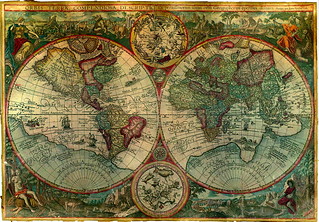Posts in this series.
Subject, Quasi-Object, Object
Quasi-Objects For Moderns And Premoderns
The Nonmoderns
We have Never Been Modern: Conclusion
 I’ve been reading We Have Never Been Modern, a 1991 book by the French thinker Bruno Latour, pictured above. It doesn’t lend itself to my usual treatment, reading and commenting on a chapter or two. Instead, I’m going to try to lay out some of the aspects that seem important enough to merit discussion.
I’ve been reading We Have Never Been Modern, a 1991 book by the French thinker Bruno Latour, pictured above. It doesn’t lend itself to my usual treatment, reading and commenting on a chapter or two. Instead, I’m going to try to lay out some of the aspects that seem important enough to merit discussion.
Background
1. It seems to me that we as a nation, and me personally, are caught up in the controversy of the day, and that dominates our conversations. I notice it not just on Twitter and in the media, but in my personal life, talking with friends.
That’s especially true in our political discourse. In the Democratic party, two candidates talk about systemic problems, but nobody focuses on their critiques. Instead, the media and the other candidates focus on details of the specific plans that rise from those critiques. They complain about cost, argue about whether those plans could be turned into law, nit-pick personalities, and say anything to distract from the central critiques. Those responses turn into the controversy of the day, and the two central and powerful critiques are never discussed. We will never know what we think about corruption or about grotesque inequality, because they are not fodder for the controversy of the day.
I hope this book will help get away from short-term thinking and into a larger perspective.
2. I agree with the definition of problems laid out by those two candidates, corruption and obscene inequality. I see them as the expected outcomes of the capitalist system. Capitalism is one part of an even bigger structure in which we find ourselves. The other part is our understanding of ourselves as individuals and as members of society. You will note that in this structure, I have divided the large structure into two parts, a) our conception of ourselves and our role in society, and b) the economy, taken as a proxy for all that isn’t human.
These two systems might seem to be separate, but they are intermixed. Neoliberal capitalism is a product of the philosophical tradition of utilitarianism. It teaches us that the individual is homo economicus, fully defined by individual production and consumption. [1] This is not a subject of discussion in the public sphere, only in backwaters in academia and the occasional blog. Other ways of understanding ourselves as individuals and as members of society are rarely discussed in any serious way outside those backwaters.
I’ve been thinking that we need a framework that places these two systems in a more united perspective. After all, these systems do intermix into an overarching system that generates each on a continuous basis, a system in which both society and the conception of the self evolve over time, all the while affecting each other.
3. In my introduction to the series on The Origins Of Totalitarianism by Hannah Arendt, I quoted this from Leszek Kolakowski’s book Modernity On Endless Trial:
If we are to believe Hegel – or Collingwood – no age, no civilization, is capable of conceptually identifying itself. This can only be done after its demise, and even then, as we know too well, such an identification is never certain or universally accepted. Both the general morphology of civilizations and the descriptions of their constitutive characteristics are notoriously controversial and heavily loaded with ideological biases, whether they express a need for self-assertion by comparison with the past or a malaise in one’s own cultural environment and the resulting nostalgia for the good times of old. Collingwood suggests that each historical period has a number of basic (“absolute”) presuppositions which it is unable clearly to articulate and which provide a latent inspiration for its explicit values and beliefs, its typical reactions and aspirations. If so, we might try to uncover those presuppositions in the lives of our ancient or medieval ancestors and perhaps build on this basis a ” history of mentalities” (as opposed to the “history of ideas”); but we are in principle prevented from revealing them in our own age, unless, of course, … we are living in the twilight, at the very end of an epoch. P. 3.
Latour tries to answer the question anyway: what does it mean to be “modern”? Arguably we are at the very end of an epoch in human history, now that relentless capitalism has rotted liberal democracies and set the planet on fire. Arguably Latour follows Collingwood’s suggestion of looking back in time to the end of one period, the premodern and the start of this period, the modern.
4. There is little point in these abstractions unless they help us solve a problem. The problem I’m thinking about is approximately this: How should we arrange society so that each of us can flourish as individuals and as social creatures who inhabit the this world with others?
Observations
1. When confronted with a problem, we often try to break it into smaller problems. Then we try to solve those and put the results back together to form a solution. That seems to work pretty well in science, where things cleave in only one or a few ways. It works less well in other areas of life, because there are all sorts of ways to divide social things up, and putting the results back together is an exercise in judgment if not guesswork.
2. I divided society into the economy and the human, because capitalism is so all-emcompassing. This has the virtue of connecting two strands of thought that run through my posts. But there are other ways we could divide it into two parts. One might be nature and society. And there are many more, some more useful than others. We should think about these divisions from the perspective of the use we intend to make of them.
3. I talk about society as if it were a monolith. If we think of society as an umbrella term that encompasses the circumstances of life in the US, it seems so. But everyone experiences those circumstances differently. It’s impossible to take those different experiences into account when we think at this level of abstraction. That doesn’t mean that these different experiences aren’t important, they are. And any hypothesis we might develop should be examined to see if that important factor would make us see things differently.
Resources
This is a difficult book, and I am not going to discuss large parts of it in detail. [2] For those interested in a brief overview, I suggest listening to Episode 230 of the podcast Partially Examined Life. It features Lynda Olman, one of the authors of an article based on an interview of Latour (Lynda Walsh in the following citation.) The first pages summarize some of Latour’s thinking. Forum: Bruno Latour on Rhetoric, by Lynda Walsh, Nathaniel A. Rivers, Jenny Rice, Laurie E. Gries, Jennifer L. Bay, Thomas Rickert & Carolyn R. Miller, Rhetoric Society Quarterly, 47:5, 403-462 (2017). It should be available online through your library.
========
[1] The hidden assertion, that the people at the top of society are exempt from this condition, is never mentioned in this discussion, although it is one of the main points made by Philip Mirowski in his book, Never Let A Serious Crisis Go to Waste.
[2] One of the things I won’t discuss is Latour’s attitude towards postmedernists such as Derrida and Lyotard. This is sad because it’s funny and quite rude, and I agree whole-heartedly.
